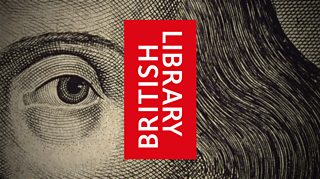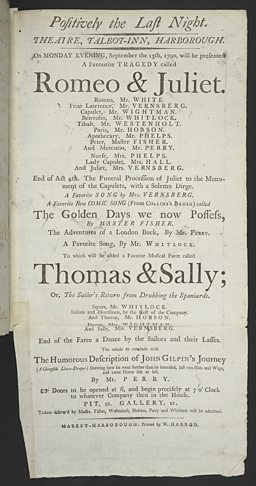Double dose of Shakespeare in a Market Harborough inn
In 1790 the Talbot Inn in Market Harborough staged two Shakespeare plays within two weeks, revealing a strong appetite for the playwright’s work even in this relatively small market town in Leicestershire - and more than a century after the Bard’s death.
Evidence of these plays happening are captured by a member of the clergy from the period – Reverend Charles Burney – who as a scholar and theatre critic collected the adverts (or playbills) of the plays.
-
![]()
Much ado near me
Hear more Shakespeare stories on BBC Radio Leicester
-
![]()
Shakespeare Festival 2016
The BBC celebrates the genius of the bard

The playbills are part of a collection of ephemera about the performing arts that he amassed, and now form part of the British Library collection (though they are not yet digitised).
But they reveal the way in which the playwright is still being revered, and their writer tries to draw in the audience by underlining themes which are relevant to an 18th century audience – such as courage, rebellion, conspiracy, and threats to the throne. They also promote the entertainment value provided by the part of Shakespeare's recurring character Sir John Falstaff.
Furthermore, the playbill emphases the fact that it’s educational – there are plenty of historical facts - the language is elegant and Shakespeare received a tidy sum for his production of the play… so it must be good!
Just thirteen days later and Romeo and Juliet is on offer at the same venue.
It is likely to have been the version adapted by the actor David Garrick in 1748. His version includes an elaborate funeral procession for Juliet with a sung choral dirge.
To build up the pathos Romeo and Juliet share a final conversation when Juliet wakes up in the tomb just before Romeo dies. It’s the version which proved popular for nearly a century.
Working around the Licensing Act
By Hannah Manktelow, University of Nottingham doctoral student, working with the British Library
Theatre productions in the 18th and 19th centuries were highly regulated by government.

The regulation began in 1737 with the Licensing Act, brought in by the then Prime Minister Robert Walpole, because his government had been subject to numerous satires on the London stage.
As a result the only way a venue could officially stage a play was if it had a patent. Given that only two patents had been issued – to Covent Garden and Drury Lane theatres in London – technically any productions outside these venues were illegal.
However, the groups of players who travelled the country to perform in the provinces often avoid prosecution by local magistrates who were often fans of the theatre themselves.
Then in the later 18th century, provincial theatres were also starting to be awarded ‘patents’ themselves, allowing them to take the name of Theatres Royal.
And in 1788, restrictions were relaxed even more. So, just two years before these performances at the Talbot Inn, smaller towns such as Market Harborough, which were not likely to gain a Theatre Royal, were able to acquire an official licence from magistrates.
Such a licence could be issued for up to sixty days at a time, provided the location was not within twenty miles of London, eight miles of a patent or licensed theatre, fourteen miles from Oxford and Cambridge or ten miles from a Royal residence.
About Shakespeare on Tour
From the moment they were written through to the present day, Shakespeare’s plays have continued to enthral and inspire audiences. They’ve been performed in venues big and small – including inns, private houses and emerging provincial theatres.

BBC English Regions is building a digital picture which tracks some of the many iconic moments across the country as we follow the ‘explosion’ in the performance of The Bard’s plays, from his own lifetime to recent times.
Drawing on fascinating new research from Records of Early English Drama (REED), plus the British Library's extensive collection of playbills, as well as expertise from De Montfort University and the Arts and Humanities Research Council, Shakespeare on Tour is a unique timeline of iconic moments of those performances, starting with his own troupe of actors, to highlights from more recent times. Listen out for stories on Shakespeare’s legacy on your BBC Local Radio station from Monday 21 March, 2016.
You never know - you might find evidence of Shakespeare’s footsteps close to home…
Craig Henderson, BBC English Regions

-
![]()
Shakespeare Lives
The nation’s greatest performing arts institutions mark 400 years since the Bard's death
Related Links
Shakespeare on Tour: Around Leicester
-
![]()
Shakespeare’s Company visit Leicester
... but was the great man with them?
-
![]()
A magnet for Lincolnshire entertainers, royalty and even Shakespeare himself?
Belvoir Castle, home of the Duke of Rutland
-
![]()
Richard returns to a Leicestershire stage
Shakespeare's portrayal of the 'crook-backed tyrant'
Shakespeare on Tour: Around the country
-
![]()
Ira Aldridge
Ira Aldridge - the first black Shakespearean actor
-
![]()
Blossoming at the Rose Theatre
Shakespeare, budding playwright and actor, at the Rose Theatre from the spring of 1592
-
![]()
Will Kemp dance finished in Norwich
Why did Will Kemp, Shakespeare's former clown, dance from London to Norwich?
-
![]()
London's Female Romeo
Charlotte Cushman, the American actress who took Victorian London by storm










